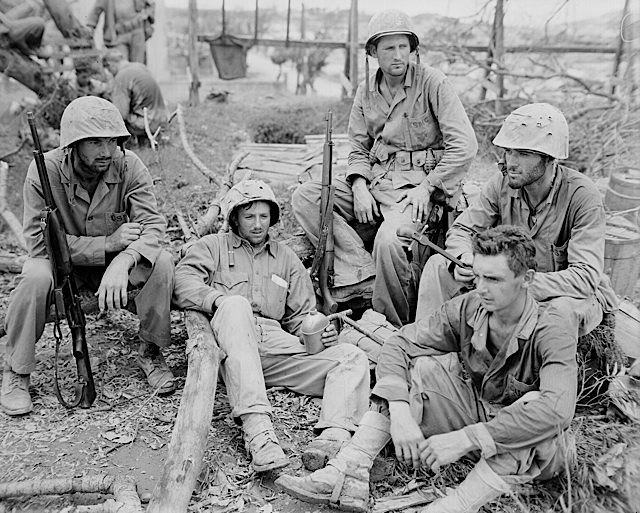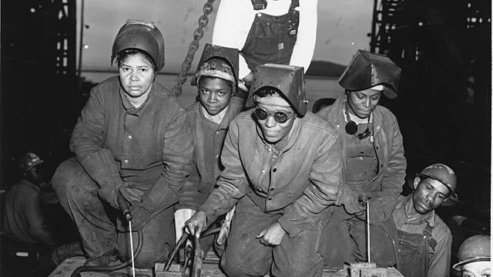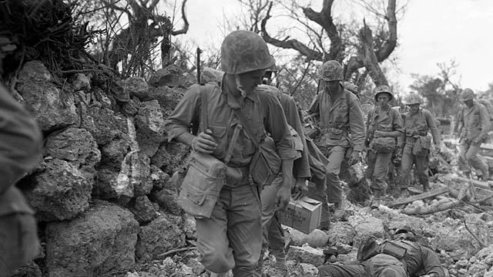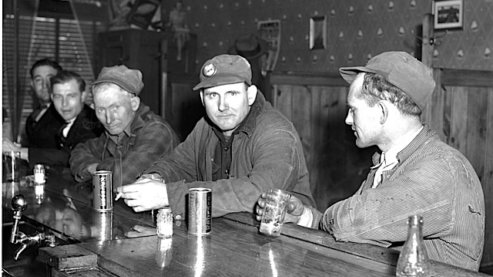Music in the Film

Commentary by Lynn Novick and Ken Burns
The music we chose for this film is an essential element in our attempt to tell the story of the war. Each composition, each recording, helped us breathe life into old photographs and archival footage, added resonance to the testimonies of our witnesses. Time and again we found that footage and photographs, however graphic, and words, however eloquent, could not alone do justice to the magnitude of the war’s devastation, could not fully convey the barbarity, bravery, depravity, resilience, and generosity of spirit that the conflict evoked in the millions of human beings who were touched by it. Again and again, we found that music – freshly created for our film as well as true to the period and gleaned from sources all across the world – helped us immeasurably in trying to describe the indescribable and express the inexpressible.
The incomparable Wynton Marsalis generously agreed to compose and help perform a number of pieces especially for us. Thanks to him, the Americans in our film go to war accompanied by strains suffused with the music that best expresses our country’s grief and tragedy, joy and triumph – the blues.
In addition to his own brilliant trumpet, these luminous tracks are graced with the artistry of Victor Goines, Walter Blanding, Jr., Carlos Henriques, Ali Jackson, Mark O’Connor, Bill Charlap and Doug Wamble, whose keening, otherworldly slide guitar on “Movin’ Back” (played with a magnetic eBOW) touches something deep and unutterable in all of us. With “Until I’m In Your Arms Again,” Wynton gave us a ballad that feels utterly contemporary, yet also embodies the bittersweet yearning of the war years.
In selecting music from the 20th Century’s classical repertoire for the series, we looked for pieces that were either composed during or inspired by the war. The composition we used more than any other in the series, Sir William Walton’s haunting, dirge-like “Passacaglia, the Death of Falstaff” (written in England, during the Blitz, for Laurence Olivier’s film Henry V,which premiered in London in November of 1944), seems to signify both the enormity of the war’s tragedy, and the intimacy of the suffering borne by individuals around the globe. Aaron Copland’s lyrical “Concerto for Clarinet,” commissioned by clarinetist Benny Goodman soon after the war, is simultaneously melancholy and hopeful, reflecting the many conflicting emotions the war fostered, particularly on the American home front. Estonian composer Arvo Part was a child during the war and grew up under the ensuing Soviet domination of his homeland. His minimalist “Variations for the Healing of Arinushka,” with its spare, plaintive melody, conjures for us the anxiety that attended the period.
The joyous big band swing tunes of the 1940s – such as Goodman’s “The Wang Wang Blues,” Count Basie’s “Basie Boogie,” Nat King Cole’s “If I Could Be With You” – reminded millions of soldiers of home and buoyed the spirits of the nation throughout the war’s long years. Distributed to the troops via V-Disks, broadcast overseas on Armed Forces Radio, and danced to at USO halls across the country, this irrepressible music became the soundtrack of the era, the embodiment of the quintessentially American spirit of affirmation in the face of adversity. Romantic ballads, too, dominated the airwaves during the war, and none affected us more than Bing Crosby’s rendition of “It’s Been a Long, Long Time,” which attests so poignantly to the prolonged separations experienced by millions of couples, as well as servicemen and their families, during the conflict.
Two virtuosic contemporary classical musicians also enhanced our soundtrack enormously – cellist Yo Yo Ma and bassist Edgar Meyer. Ma’s recording of Kayhan Kalhor’s “Blue as the Turquoise Night of Neyshabur,” made with the Silk Road Ensemble, fuses the sounds of Western stringed instruments with tabla drums of India and lutes of the Middle East. The sense of foreboding and mystery that pervades this piece amplified and intensified some of the film’s darkest moments. Edgar Meyer’s propulsive “In the Nick of Time” animated some of the film’s most significant action scenes, particularly the crossing of the English Channel on June 6, 1944 – D-Day.
One contemporary tune, Gene Scheer’s “American Anthem,” became a touchstone that we returned to again and again, a reflection of the complex sentiments in our witnesses’ heartfelt testimonies. Norah Jones’s beautiful rendition of the song gave us the opportunity to hear Scheer’s affecting lyrics, which seem to give voice to the sacrifice, selflessness and bravery of those we have tried to honor, the men and women who fought and won that necessary war on our behalf.
“American Anthem”words and music by Gene Scheer
All that we’ve been given by those who came before,
The dream of a nation where freedom would endure.
The work and prayers of centuries have brought us to this day.
What shall be our legacy, what will our children say?
Let them say of me, I was one who believed in sharing the blessings I received.
Let me know in my heart when my days are through,
America, America, I gave my best to you.
America, America, I gave my best to you.
Each generation from the plains to distant shores,
With the gifts they were given were determined to leave more.
Battles fought together, acts of conscience fought alone,
These are the seeds from which America has grown.
Let them say of me I was one who believed
In sharing the blessings I received.
Let me know in my heart when my days are through,
America, America, I gave my best to you.
America, America, I gave my best to you.
For those who say they have nothing to share,
Who feel in their hearts there is no hero there,
Though each quiet act of dignity is that which fortifies,
The soul of a nation, that will never die.
Let them say of me that I was one who believed
In sharing the blessings I received.
Let me know in my heart when my days are through,
America, America, I gave my best to you.
America, America, I gave my best to you.



